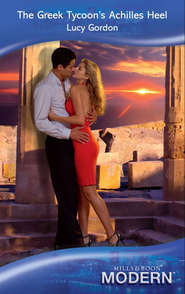По всем вопросам обращайтесь на: info@litportal.ru
(©) 2003-2024.
✖
And the Bride Wore Red
Автор
Год написания книги
2018
Настройки чтения
Размер шрифта
Высота строк
Поля
‘Not Guy, Freddy. She’s finished with Guy, or he finished with her, one of the two. I can’t keep up.’
Olivia sighed wryly. ‘I’ll call her and commiserate.’
‘Not too much or you’ll make her worse,’ Norah said at once. ‘She’s a silly woman. I’ve always said so. Mind you, it’s not all her fault. Her own mother has a lot to answer for. Fancy giving her a stupid name like Melisande! She was bound to see herself as a romantic heroine.’
‘You mean,’ Olivia said, ‘that if Mum had been called something dull and sensible she wouldn’t have eloped?’
‘Probably not, although I think she’d have been self-centred whatever she was called. She’s never thought of anyone but herself. She’s certainly never thought of you, any more than your father has. Heaven alone knows what he’s doing now, although I did hear a rumour that he’s got some girl pregnant.’
‘Again?’
‘Yes, and he’s going about preening as though he’s the first man who’s ever managed it. Forget him. The great fool isn’t worth bothering with.’
Thus she dismissed her nephew—with some justice, as Olivia had to admit.
They chatted for a while longer before bidding each other an affectionate goodnight. Olivia delayed just long enough to make herself a basic meal, then fell thankfully into bed, ready to fall asleep at once.
Instead she lay awake, too restless for sleep. Mysteriously, Dr Mitchell had found his way into her thoughts, and she remembered him saying, Other people have to pick up the pieces, and often it is they who get hurt.
He’d given her a look full of wry kindness, as if guessing that she was often the person who had to come to the rescue—which was shrewd of him, she realised, because he’d been right.
As far back as she could remember she’d been the rock of stability in her family. Her parents’ marriage had been a disaster. They’d married young in a fever of romance, had quickly been disillusioned by prosaic reality and had headed for divorce. Since then her mother had remarried and divorced again before settling for lovers. Her father had moved straight onto the lovers.
She herself had been passed from pillar to post, depending on whichever of them had felt she could be most useful. They had lavished noisy affection on her without ever managing to be convincing. Their birthday and Christmas gifts had been expensive, but she’d realised early on that they were aimed at scoring points off each other.
‘Let’s see what your father thinks of that,’ her mother had said, proudly revealing a state-of-the-art, top-of-the-range, laptop. But she’d been too busy to come and see Olivia in the school play, which would have meant far more.
The person who’d always come to school functions was Norah, her father’s aunt. When both her parents had been busy, Olivia had gone to Norah for long visits and found that here was someone she could talk to. Norah had encouraged her to say what she was thinking. She would argue, forcing the girl to define her ideas then enlarge on them, until Olivia had begun to realise that her own thoughts were actually worth discussing—something she’d never discovered with her parents, who could talk only about themselves.
There’d always been a bedroom for her in Norah’s home, and when she’d turned sixteen she’d moved into it full-time.
‘How did that pair of adolescents you call parents react to the idea?’ Norah demanded.
‘I’m not sure they quite realise that I’ve gone,’ Olivia said. ‘He thinks I’m with her, she thinks I’m with him. Oh, what do they matter?’
It was possible to cope with her parents’ selfish indifference because Norah’s love was there like a rock. Even so, it was painful to discover yet again how little they really cared about her.
Eventually her mother asked, ‘Will you be all right with Norah? She’s a bit—you know—’ she’d lowered her voice as though describing some great crime ‘—fuddy-duddy.’
It crossed Olivia’s mind that ‘fuddy-duddy’ might be a welcome quality in a parent, but she said nothing. She’d learned discretion at an early age. She assured her mother that she would be fine, and the subject was allowed to die.
Before leaving, Melisande had one final request.
‘Would you mind not calling me Mum when there are people around? It sounds so middle-aged, and I’m only thirty-one.’
Olivia frowned. ‘Thirty-three, surely? Because I was born when—’
‘Oh, darling, must you be so literal? I only look thirty-one. In fact, I’ve been told I look twenty-five. Surely you understand about artistic licence?’
‘Of course,’ Olivia agreed with a touch of bitterness that passed her mother by. ‘And if I start claiming you as my mother it spoils the effect.’
‘Exactly!’ Melisande beamed, entirely missing the irony in her daughter’s voice. ‘You can call me Melly if you like.’
‘Gosh, thanks, Mum.’
Her mother gave her a sharp look but didn’t make the mistake of replying.
That evening, she told Norah, who was disgusted.
‘Fuddy-duddy! She means I don’t live my life at the mercy of every wind that blows.’
‘She just thinks you know nothing about love,’ Olivia pointed out.
When Norah didn’t answer, she persisted, ‘But she’s wrong, isn’t she? There’s someone you never talk about.’
That was how she’d first heard about Edward, who’d died so long ago that nobody else remembered him, or the volcano he’d caused in the life of the girl who’d loved him. Norah told her only a little that night, but more later on, as Olivia grew old enough to understand.
Norah had been eighteen when she’d met Edward, a young army-officer, nineteen when they’d celebrated his promotion by becoming engaged, and twenty when he’d died, far away in another country. She had never loved another man.
The bleak simplicity of the story shocked Olivia. Later she learned to set it beside her own parents’ superficial romances, and was equally appalled by both.
Had that lesson hovered somewhere in her mind when she too had fallen disastrously in love?
Looking back, she could see that her life-long cynicism about emotion, far from protecting her, had left her vulnerable. She’d determinedly avoided the youthful experiences on which most girls cut their romantic teeth, proud of the way her heart had never been broken because she’d never become involved. But it meant that she’d had no yardstick by which to judge Andy, no caution to warn her of signs that other women would have seen. Her capitulation to him had been total, joyful, and his betrayal had left her defenceless.
She’d fled, seeking a new life here in China, vowing never to make the same mistake again. From now on men would no longer exist. Neither would love, or anything that reminded her of ‘the whole romantic nonsense’ as she inwardly called it. And so she would be safe.
On that comforting thought, she fell asleep.
But tonight her sleep was mysteriously disturbed. Phantoms chased through her dreams, making her hot and cold by turns, causing her blood to race and her heart to pound. She awoke abruptly to find herself sitting up in bed, not knowing when it had happened, not knowing anything, except that suddenly there was no safety in all the world.
Chapter Two
THE next day Olivia felt down from the moment she awoke. The sight of herself in the bathroom mirror was off-putting. Where was the vibrant young woman in her twenties with a slender figure, rich, honey-coloured hair and large blue eyes that could say so much?
‘I don’t think she ever really existed,’ she informed her reflection gloomily. ‘You’re the reality.’
She wondered if she might still be in shock from her nasty fall, but dismissed that as just making excuses.
‘I’m a hag,’ she muttered. ‘I look older than I am. I’m too thin, and my hair is just plain drab. I’ll be going grey next.’
The woman in the mirror stared back, offering not a glimmer of sympathy. Normally Olivia wore her wavy hair long and bouncy but today she pulled it back into an efficient-looking bun. It suited her mood.
The day continued to be glum for no apparent reason. Her students were attentive and well-behaved, lunch was appetizing and her friends on the staff made kindly enquiries as to her health. Mrs Wu even tried to send her home.
‘It’s a reaction to that fall,’ she said. ‘Go home and rest.’
‘Dong doesn’t seem to need rest,’ Olivia pointed out. ‘I actually had to stop him trying to climb that tree again.’











